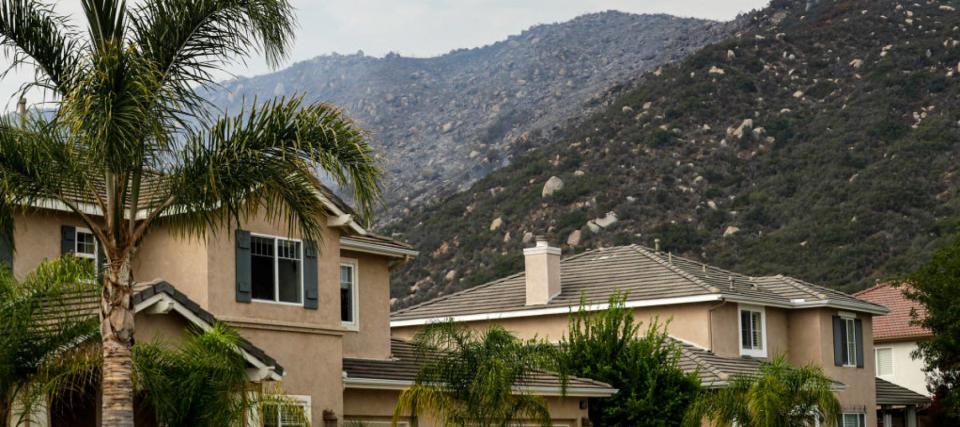Controversy swirls around California’s failed wildfire insurance bill that would have cut costs for homeowners

Due to California's wildfire insurance crisis, homeowners in fire-prone areas are facing increasingly high rates or losing coverage altogether.
Don't miss
Car insurance premiums in America are through the roof — and only getting worse. But 5 minutes could have you paying as little as $29/month
Lock in juicy quarterly income through this $1B private real estate fund — even if you’re not a millionaire. Here’s how to get started with as little as $10
5 minutes could get you up to $2M in life insurance coverage — with no medical exam or blood test
Though the number of fires this year is similar to last, the area burned in 2023 is almost 20 times larger. Despite investing thousands in fire mitigation measures, homeowners continue to be dropped by their insurance providers. Recently, State Farm and Allstate announced plans to reduce coverage in the state.
Two legislative bills aimed at providing homeowners with relief from the insurance crisis failed to pass this year. Assembly Bill 2416 authored by Assemblymember Damon Connolly and Senate Bill 1060 written by Senator Josh Becker aimed to reduce insurance costs for homeowners who invest in fire mitigation.
While AB 2416 would not have had "a meaningful impact" on consumers, SB 1060 is another story, according to Carmen Balber, executive director of the advocacy group Consumer Watchdog.
“The clear problem that homeowners are facing today is that they could spend tens of thousands of dollars protecting their home from wildfire and still have their home insurance nonrenewed, and that is not a sustainable state of affairs,” said Balber to the San Francisco Chronicle. “Sen. Becker’s bill would have begun to close that gap.”
ABC7 News has since looked at campaign contributions and lawmakers' votes on the SB 1060 bill.
How SB 1060 would have helped
SB 1060 would have required insurance companies to factor mitigation efforts into their risk assessment models and increased transparency on these evaluations. It aimed to lower premiums and create a more transparent market. It was passed in the Senate, but was pulled in the Assembly.
Becker told ABC7 he didn't bring the bill up for a final hearing, citing a lack of support and unwelcome amendments added by insurance companies.
"I rejected insurance industry amendments that would have rendered it useless and intend to reintroduce an effective version of the bill next year," he said.
Read more: These 5 magic money moves will boost you up America's net worth ladder in 2024 — and you can complete each step within minutes. [https://moneywise.com/managing-money/how-to-earn-money/money-moves-to-make-right-now?throw=C2HALF_streamline)
&placement_syn=placement_2&native_creative_id=295&targeting_group=284
Following the money trail
ABC7 looked at campaign contributions data compiled by nonprofit and watchdog group Follow the Money and found that the 11 senators who voted against SB 1060 or were reported as "absent" for the vote received campaign contributions from the "Finance, Insurance and Real Estate Industries" totaling over $4 million since assuming political office. These are contributions from individuals and political action committees.
State Senator Janet Nguyen, who voted against the bill, represents Laguna Niguel, a region devastated by wildfires. She received $866,870 from these industries. State Senator Brian Dahle, whose district has suffered multiple catastrophic fires, voted against SB 1060, citing the bill’s complexity and alleged conflicts with the Governor’s executive orders. He received approx. $570,038 from these industries since assuming office in the state assembly in 2012. The report said that's 56% of all the money he's received while in office.
Sen. Becker received $417,697 from those industries since assuming office.
"It's shocking that a legislator that represents a fire-torn area could vote no on a bill that requires that companies take into account hardening. I mean, the point of the modeling is to know that certain areas are more prone to fires. And if you're not taking into consideration home hardening and those type[s] of wildfire prevention tactics, then what are you modeling? What are you doing?"Jamie Court, president of Consumer Watchdog, said to ABC7. "Four million dollars is an awful lot of money in a state legislature to give to less than a dozen legislators, cause the contribution limits are so low. It means that they really, really mobilized."
What to read next
Cost-of-living in America is still out of control — use these 3 'real assets' to protect your wealth today, no matter what the US Fed does or says
'It's not taxed at all': Warren Buffett shares the 'best investment' you can make when battling rising costs — take advantage today
82% of Americans are missing out on a savings account that pays over 10 times the national average
This article provides information only and should not be construed as advice. It is provided without warranty of any kind.